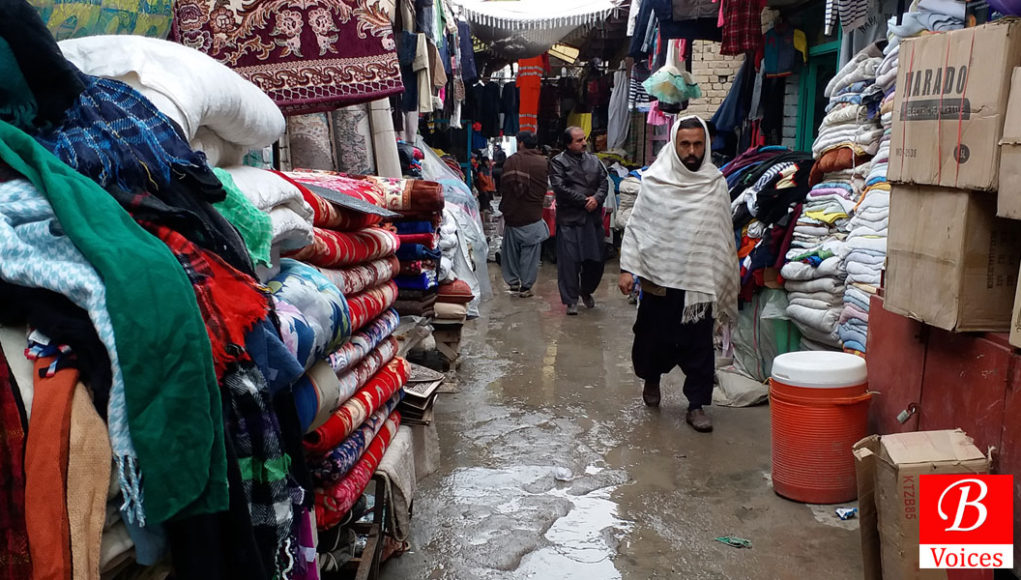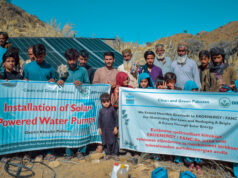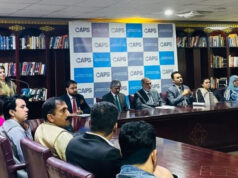Anisa Shabir
“Jazak Allah, jazak Allah,” a voice was blaring out in the distance, thanking people who were giving charity. It would be used to build a mosque for the newly bought land. There was no man standing, so it must have been recorded. It was monotonous and in a loop.
Cars usually line the sides of the double-lane road. The area is known for its endless garages and flea market selling spare parts for the cars. Zarghoon Motors showroom is the only structure that stands out for its remarkable interior, displaying new cars, ready for sale.
It had snowed heavily in Quetta, on January 12, 2020. The mountains were still clad in white after a week, and the roadsides were slippery because the snow that had started melting was frozen due to low temperature. One had to watch their step.
There is an alley opposite the showroom. A whole new world lies within. People, usually buyers, or collectors-in case they have made it their hobby and are looking for rare items- come here to buy a wide array of objects, ranging from sweaters, coats, jackets, polyester duvets to fight the cold and chilly weather of Quetta to decoration pieces, crockery, and paintings to adorn the walls of their houses. These are second-hand objects.
Crossing the slippery surface is no big feat, compared to water puddles that a visitor comes across throughout their journey to this rarely seen world. It was silent, except for the occasional murmurs of shopkeepers and customers that could be heard from the dimly lit shops.
Other shopkeepers were standing outside their shops, scanning the passersby for potential buyers. It is a good day if a customer chooses to buy from them, considering how the recent snowfall had affected their business. “I earn 1000-1200 rupees a day,” said Naimat Ullah, a crockery shop owner, whose stock comes from the Chaman border, that connects Pakistan with Afghanistan, “people value these pieces, and it earns me enough for a month.”
There was a shop that had two entrances, both on adjacent walls, like two rectangular cuts made into a cardboard box. On the wooden table lay Dublin: Official Guide among other titles. Its tattered cover depicting Volkswagen, probably a 1960s model and other decades-old cars, and green buses on the street, told a story of how the owner might have abandoned the guide, and it traveled all the way from Ireland, ending up in Quetta’s flea market. The Romantic Novels of Barbara Cartland, Winning his Spurs by G.A. Henty, or paperbacks as new as Paula Hawkins’ Into the Water, also adorned the table.
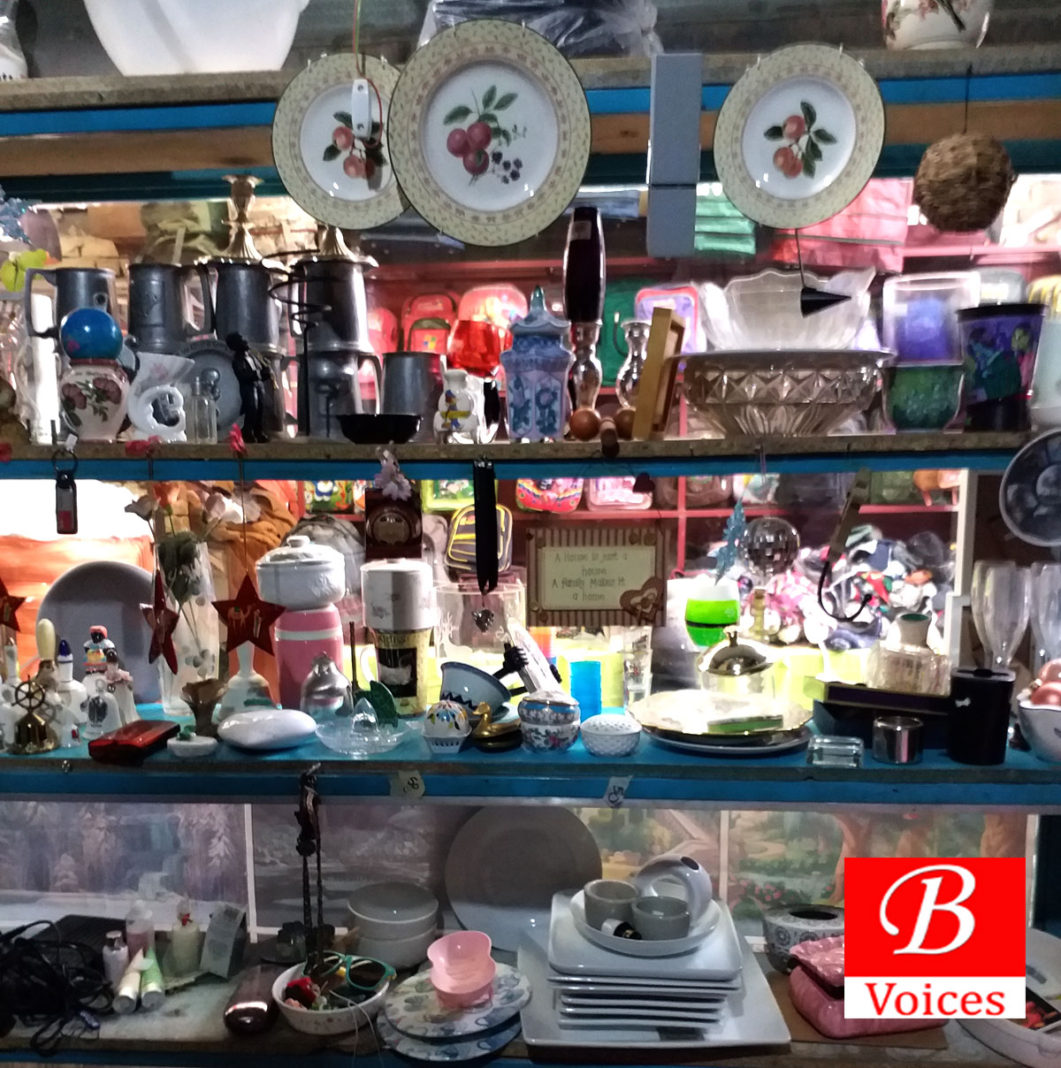
The crockery and decoration pieces are cheaper than the ones available in other shops of Quetta. One thing that differentiates the items of the flea market is its quality. “People want quality, and they know when an item is of good quality and is England or France-made,” Sher Ahmed, a shop owner selling crockery, decoration pieces, and electronics, explained why people would rather buy second-hand objects that are cheaper too.
The triangular fiberglass structure acting as a roof above the alley provides meager shelter from the water seeping through and dribbling on top of the visitors. Multicolored rugs, some garish with floral patterns, and warm blankets, soft and in good condition, are the favorites of female visitors.
Then there was a din. “Have you gone nuts?!” It was Abdul Razzak, owner of the shop selling pillows, polyester duvets, cushion covers, letting out a frustrated cry at a female customer, covered in chador, who was bargaining to buy her desired items on a low price.
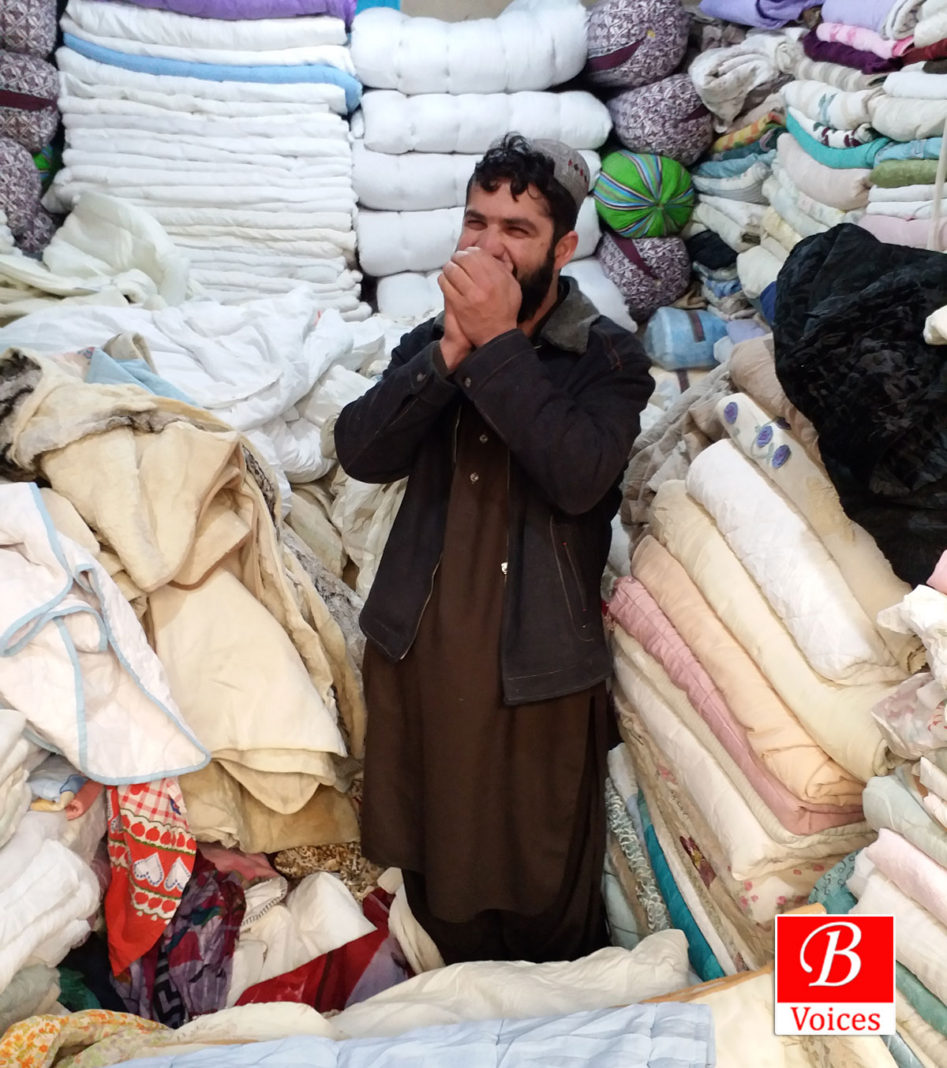
“Three hundred rupees for two pillows,” she said, “and that’s final.” Abdul Razaq retorted, “not possible, I won’t sell them to you.”
“Of course, you will. Look, brother, I don’t have time and I am tired,” it was a final attempt on her behalf, and the seller knowing he could not lose the customer, gave in. Both settled for four hundred rupees for two pillows.
Abdul Razzak was more like a Tarzan, except that there was no jungle, but the pillows from floor to ceiling which he could hop on, fetching the required items for his customers. He lamented the fact that they did not have gas in the area when asked how life was in this part of the world. According to him, his precious collection was from Germany, having traveled all the way to Karachi Port via sea route, and finally made its way to Quetta.
Long hours can leave a visitor weary. A waft of freshly cooked popcorn is enough to make a person go in search of it. There were a cart and a popcorn seller. He and his cart were pinned against the wall, to leave the space for the passersby in the narrow passageway.
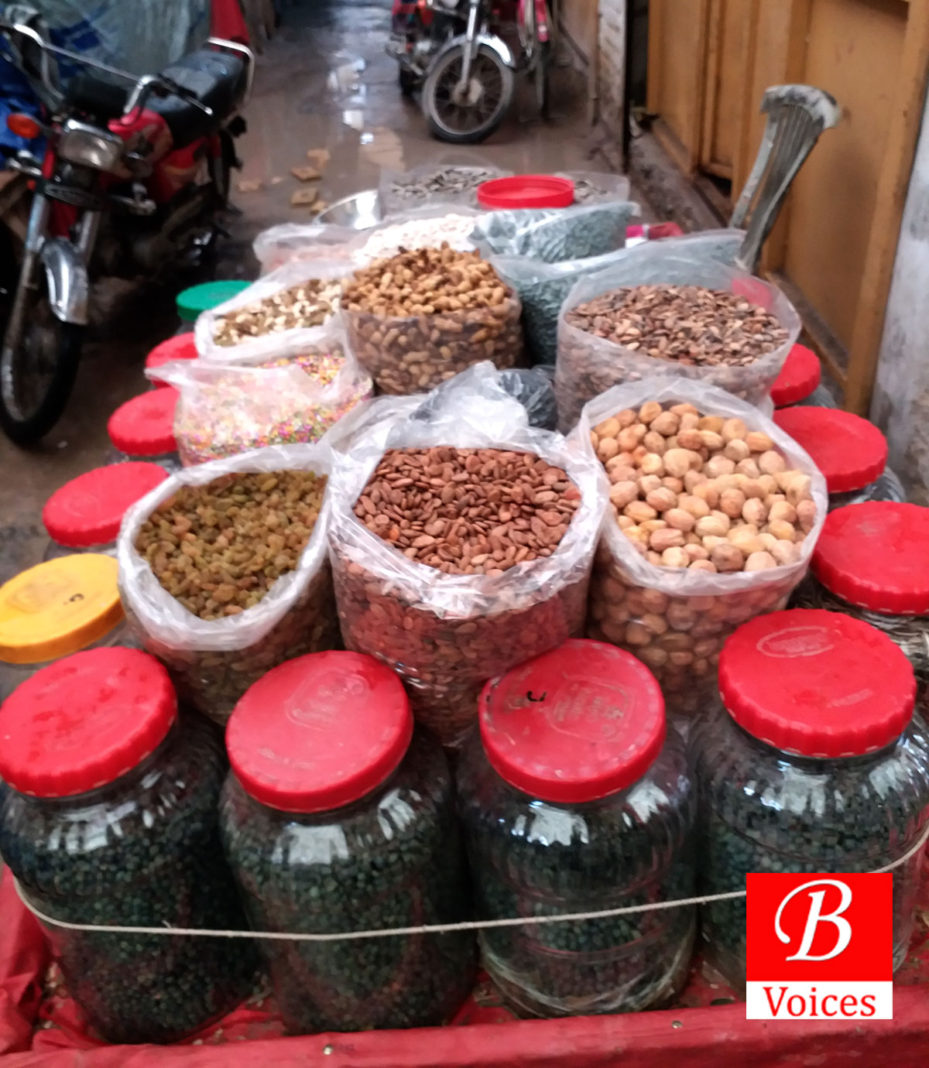
Dry fruit cart is also a pleasant sight, especially if one loves shinay, a round, dark greenish dry fruit, which is loved by the locals. Abdul Nafi had plenty in store, and it earned him a good deal of money.
Flea market, on days without rain and snow, is flocked by people. There are shops, even with a throng of people visiting, that remain desolate. The old flip, 2000s version of cellphones, watches of all sorts and colors lying in the stained showcase of one empty shop paints a bleak picture of the unsuccessful business.
Going deeper makes one think it is the end of the line. There was hardly any visitor visible, except for the shopkeepers who were waiting for the customers. This is where music was thumping out of one of the shops. Dum, dum, dum. The lyrics were incomprehensible. A rare sight in the back of the market. Checking it out becomes necessary. A young adolescent boy, with a neatly trimmed beard, and eyes of a greenish hue, was busy in sorting the cosmetic products of all kind, arranged in rows.
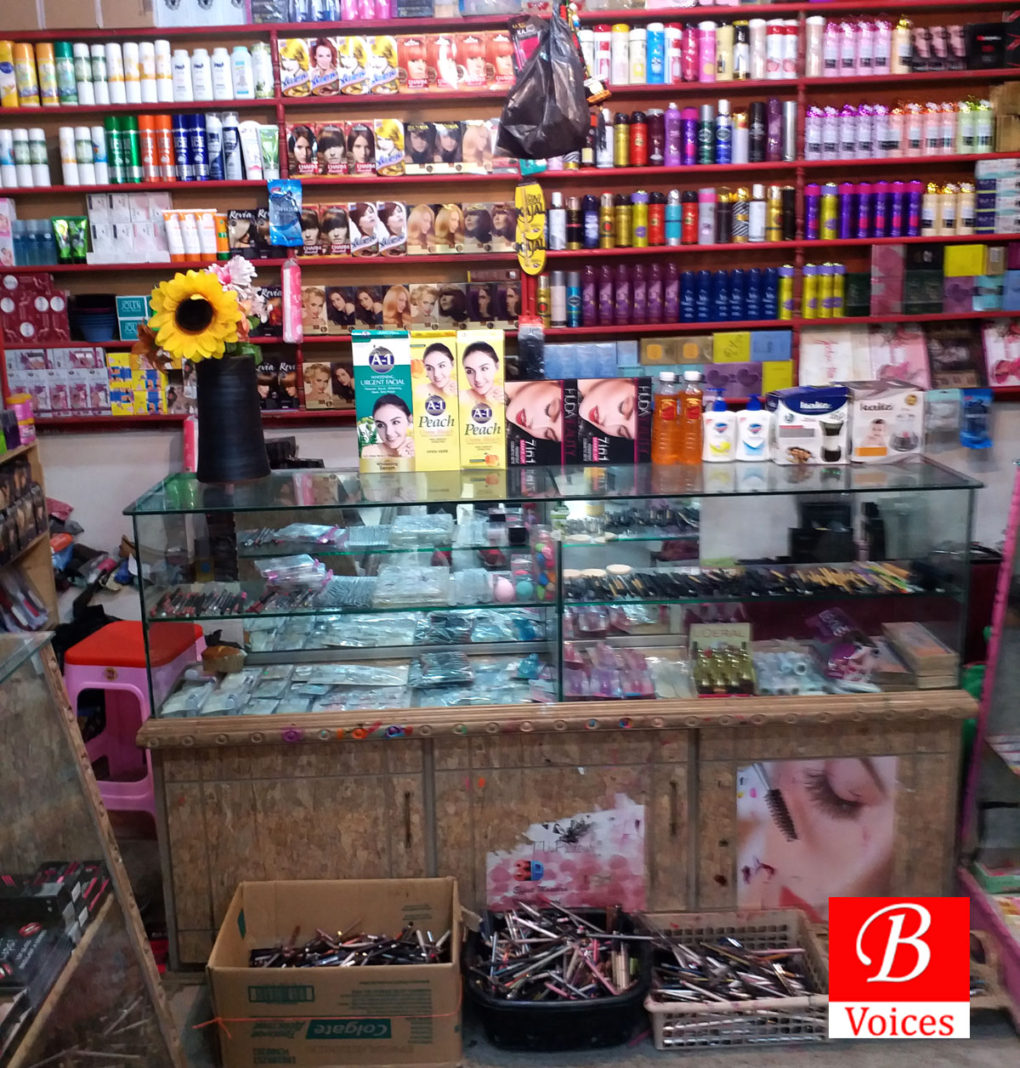
Rahmat did not want his picture to be taken. He was chatty, priding himself with the possession of the finest collection available in the city. “It’s from the border,” Rahmat said, indicating that his stock was from the Chaman border. He was confident about his products, “I will give you one product, use it, and you won’t feel any difference between the one available here and elsewhere.”
Anisa Shabir is a writer based in Quetta. She is near graduating in BS program of Media and Journalism from Sardar Bahadur Khan Women’s University. She tweets at @shabir_anisa.
Share your comments!


